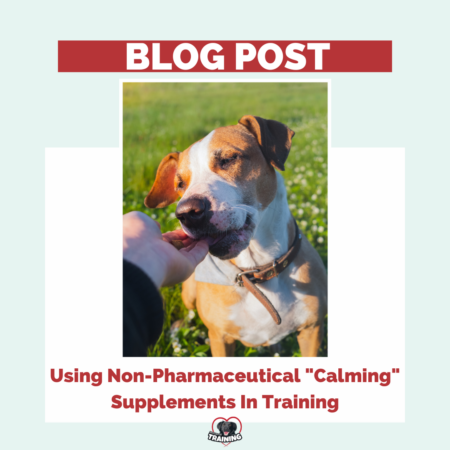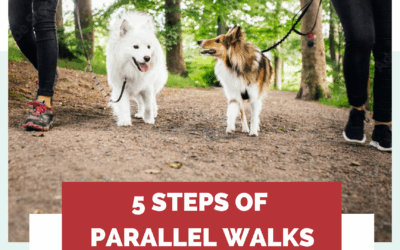Let me first start this post with my standard disclaimer: I AM NOT A VET. But as a trainer in the US who specializes in fear, aggression, reactivity and separation anxiety, I get asked a lot about medication and non-pharmaceutical interventions like calming chews and CBD. That’s what’s driving this post.
Let me also say I am pro-meds when they can help. I have a pro-meds intervention bias when the dog is struggling. I am pro-science and evidence based studies. This means I will not recommend you give your dog things that do not have peer-reviewed or veterinary evidence to support efficacy or safeness. Be sure to read my post here about Behavioral Medication In Training.
I also understand wanting a “natural” approach or not wanting to “drug” your dog and I address many myths about medication in the post linked above. I understand the justified distrust (and hate) of big pharma but just like in human mental health where there are often a lot of stigmas about mental illnesses and medication and the same is true for dogs. And while I understand not wanting to use meds as a gut reaction, this could mean prolonging your dog’s mental suffering. I do not think every dog should be on meds or benefits from meds. But many fearful, aggressive or anxious dogs (whatever their “issue” is) can benefit greatly from meds.
And let’s be clear – “natural” doesn’t mean there are no risks. Natural doesn’t mean safe, effective or regulated. In fact, using the term “natural” in advertising isn’t even regulated or clearly defined by the FDA! One frustration many of my vet friends express is owners self-medicating their dogs with “natural” supplements not realizing those things can have negative impacts but pushing back on proven, tested medications they recommend. (And to put a common myth to bed, vets are not get “kick-backs” from recommending medications. If they were, they wouldn’t be struggling to cover student loan debts and have one of the highest suicide rates of all professions. Vets want what is best for your animal.)
I’ve long lumped supplements into a “can’t hurt, might help” category but I’ve developing a stronger bias away from even that ideology. Why do I have reservations about using unproven, untested, unregulated products and supplements like calming chews and CBD for behavior?
- First and foremost, using these things often delays people seeking training, specialized help from a VB or real medication for their dog. This means the dog is suffering longer than needed from getting help or relief from their anxiety and fear.
- Because these supplements are unregulated, we don’t know for certain that they don’t cause harm or interact with other medications. In this study it showed that “CBD appeared to attenuate the effects of trazodone.” And recommended, “It may be inadvisable to administer CBD concomitantly with other products or medications as the results from this study highlight potential drug interactions associated with CBD use.” In some studies, like this one, it showed CBD elevated liver values.
- Unregulated also means there are inconsistent amounts in different batches or across brands. In a study about CBD and labeling, results showed only about 31% of products are labeled accurately, when tested. Researchers found “that with respect to CBD, about 43 percent have a higher concentration than stated, and about 26 percent have less than claimed.” This makes consistency in training very difficult and can cause difficulties accurately tracking data. Conversely, 50mg of pharmaceutical medication will always be 50mg of medication because it’s regulated by the FDA.
- They’re expensive and clients often cite costs, money for training or medications as an obstacle to achieving their training goals. With little to no evidence most of these products are effective I’d rather clients spend money on proven training methods and medications rather than potentially waste money on ineffective options. In that same noise aversion study I mentioned above, they concluded there was no “strong support of an anxiolytic effect of CBD in dogs…Trazodone, but not CBD, decreased plasma cortisol concentration.” Trazodone alone worked, CBD alone did not. In this study, researchers concluded CBD does not impact the overall daily activity of adult dogs. Total daily activity including duration of the activity, sleep quality, and resting were unaffected by CBD. Similarly, activity during the exercise periods was also unaffected by CBD.”
Many people will anecdotally say their dog is better on CBD but I suspect that is a bit of a placebo effect on the human. I look forward to the day when we have more peer-reviewed evidence on CBD or other alternative treatments but until then, if your dog is so anxious or fearful that you feel you need to give them something to help them, it likely needs to be real drugs. A Thundershirt, pheromone-sprayed bandana, CBD and calming chew isn’t going to cut it if your dog has real anxiety or fears. Training and medication always need to be done together. There is no magic pill, natural or otherwise, that will “fix” your dog.
As a side note, there are some studies that show CBD can have some positive impacts for seizures and arthritis (another arthritis study here). And many of the studies listed above have very small sample sizes but until there’s more research, studies like these are all we have to look at. And in one study, 4 out of 29 products contained unsafe heavy metals. Bottom line is this, more research with different CBD products and dosages is necessary to understand how to effectively treat dogs with anxiety.
For details on other calming products I’m lumping into this category you can read this post from soon to be VB, Dr. Alison Gerken. (Some Canadian friends said they were unable to open the link on their phones but computers were able. This might be a setting from PetMD that I cannot control.)
Let’s work to help your dog (and you) get the relief you both need. Check out my Separation Anxiety Training Foundations (SATF) course, or if you want one on one training, contact me and schedule a session! And sign up for my weekly newsletter so you never miss a post!
Happy training!
![]()




